- Home
- Jr. Horatio Alger
The Young Musician; Or, Fighting His Way
The Young Musician; Or, Fighting His Way Read online
Produced by Carrie Fellman
THE YOUNG MUSICIAN
or
FIGHTING HIS WAY
By Horatio Alger
Chicago
CONTENTS
I. A Candidate for the Poorhouse
II. Philip at Home
III. Nick Holden's Call
IV. The Auction
V. An Alliance Against Philip
VI. "A Fuss About a Fiddle"
VII. Mr. Joe Tucker
VIII. In the Enemy's Hands
IX. The Poorhouse
X. Bad Tidings
XI. Philip's New Room
XII. A Pauper's Meal
XIII. A Friendly Mission
XIV. Philip Makes His Escape
XV. Escape and Flight
XVI. A Night Adventure
XVII. A Reformed Burglar
XVIII. A Professional Engagement
XIX. New Acquaintances
XX. A Lively Evening
XXI. Fortune Smiles Again
XXII. Rival Musicians
XXIII. An Hour of Triumph
XXIV. Lorenzo Riccabocca
XXV. A Change of Name
XXVI. A Promising Plan
XXVII. Unexpected Honors
XXVIII. A Triumphant Success
XXIX. Beset by Creditors
XXX. A Timely Gift
XXXI. The Professor's Flight
XXXII. The Race Across Fields
XXXIII. The Lost Wallet
XXXIV. A New Business Proposal
XXXV. Squire Pope Is Amazed
XXXVI. The Pretended Guardian
XXXVII. His Own Master
XXXVIII. An Offer Declined
XXXIX. An Ambitious Wayfarer
XL. The Indian Hunter
XXI. An Adventure in the Woods
XLII. An Indian at Last
XLIII. A Welcome Letter
XLIV. A Fresh Start
CHAPTER I. A CANDIDATE FOR THE POORHOUSE.
"As for the boy," said Squire Pope, with his usual autocratic air, "Ishall place him in the poorhouse."
"But, Benjamin," said gentle Mrs. Pope, who had a kindly and sympatheticheart, "isn't that a little hard?"
"Hard, Almira?" said the squire, arching his eyebrows. "I fail tocomprehend your meaning."
"You know Philip has been tenderly reared, and has always had acomfortable home--"
"He will have a comfortable home now, Mrs. Pope. Probably you are notaware that it cost the town two thousand dollars last year to maintainthe almshouse. I can show you the item in the town report."
"I don't doubt it at all, husband," said Mrs. Pope gently. "Of courseyou know all about it, being a public man."
Squire Pope smiled complacently. It pleased him to be spoken of as apublic man.
"Ahem! Well, yes, I believe I have no inconsiderable influence in townaffairs," he responded. "I am on the board of selectmen, and am chairmanof the overseers of the poor, and in that capacity I shall convey PhilipGray to the comfortable and well-ordered institution which the town hasset apart for the relief of paupers."
"I don't like to think of Philip as a pauper," said Mrs. Pope, in adeprecating tone.
"What else is he?" urged her husband. "His father hasn't left a cent. Henever was a good manager."
"Won't the furniture sell for something, Benjamin?"
"It will sell for about enough to pay the funeral expenses andoutstanding debts-that is all."
"But it seems so hard for a boy well brought up to go to the poorhouse."
"You mean well, Almira, but you let your feelings run away with you. Youmay depend upon it, it is the best thing for the boy. But I must write aletter in time for the mail."
Squire Pope rose from the breakfast-table and walked out of the roomwith his usual air of importance. Not even in the privacy of thedomestic circle did he forget his social and official importance.
Who was Squire Pope?
We already know that he held two important offices in the town ofNorton. He was a portly man, and especially cultivated dignity ofdeportment. Being in easy circumstances, and even rich for the residentof a village, he was naturally looked up to and credited with a worldlysagacity far beyond what he actually possessed.
At any rate, he may be considered the magnate of Norton. Occasionally hevisited New York, and had been very much annoyed to find that his ruralimportance did not avail him there, and that he was treated with nosort of deference by those whom he had occasion to meet. Somehow, thecitizens of the commercial metropolis never suspected for a singlemoment that he was a great man.
When Squire Pope had finished his letter, he took his hat, and withmeasured dignity, walked to the village post-office.
He met several of his neighbors there, and greeted them with affablecondescension. He was polite to those of all rank, as that was essentialto his retaining the town offices, which he would have been unwilling toresign.
From the post-office the squire, as he remembered the conversation whichhad taken place at the breakfast-table, went to make an official call onthe boy whose fate he had so summarily decided.
Before the call, it may be well to say a word about Philip Gray, ourhero, and the circumstances which had led to his present destitution.
His father had once been engaged in mercantile business, but hishealth failed, his business suffered, and he found it best-indeed,necessary--to settle up his affairs altogether and live in quietretirement in Norton.
The expenses of living there were small, but his resources were small,also, and he lived just long enough to exhaust them.
It was this thought that gave him solicitude on his death-bed, for heleft a boy of fifteen wholly unprovided for.
Let us go back a week and record what passed at the last interviewbetween Philip and his father before the latter passed into the state ofunconsciousness which preceded death.
"Are you in pain, father?" asked Philip, with earnest sympathy, as hisfather lay outstretched on the bed, his face overspread by the deathlypallor which was the harbinger of dissolution.
"Not of the body, Philip," said Mr. Gray. "That is spared me, but I ownthat my mind is ill at ease."
"Do you mind telling me why, father!"
"No; for it relates to you, my son, or, rather, to your future. When myaffairs are settled, I fear there will be nothing left for your support.I shall leave you penniless."
"If that is all, father, don't let that trouble you."
"I am afraid, Philip, you don't realize what it is to be thrown upon thecold charities of the world."
"I shall work for my living," said Philip confidently.
"You will have to do that, I'm afraid, Philip."
"But I am not afraid to work, father. Didn't you tell me one day thatmany of our most successful men had to work their way up from earlypoverty!"
"Yes, that is true; but a boy cannot always get the chance to earn hisliving. Of one thing I am glad; you have a good education for a boy ofyour age. That is always a help."
"Thanks to you, father."
"Yes; though an invalid, I have, at all events, been able to giveprivate attention to your education, and to do better for you than thevillage school would have done. I wish I had some relative to whom Imight consign you, but you will be alone in the world."
"Have I no relatives?" asked Philip.
"Your mother was an only child, and I had but one brother."
"What became of him, father?"
"He got into trouble w
hen he was a young man, and left the country.Where he went to I have no idea. Probably he went first to Europe, and Iheard a rumor, at one time, that he had visited Australia. But that wastwenty years ago, and as I have heard nothing of him since, I think itprobable that he is dead. Even if he were living, and I knew where hewas, I am not sure whether he would make a safe guardian for you."
"Have you any advice to give me, father?" asked Philip, after a pause."Whatever your wishes may be, I will try to observe them."
"I do not doubt it, Philip. You have always been an obedient son, andhave been considerate of my weakness. I will think it over, and try togive you some directions which may be of service to you. Perhaps I maybe able to think of some business friend to whom I can commend you."
"You have talked enough, father," said Philip, noticing his father'sincreasing pallor and the evident exertion with which he spoke. "Restnow, and to-morrow we can talk again."
Mr. Gray was evidently in need of rest. He closed his eyes andapparently slept. But he never awoke to consciousness. The conversationabove recorded was the last he was able to hold with his son. For twodays he remained in a kind of stupor, and at the end of that time hedied.
Philip's grief was not violent. He had so long anticipated his father'sdeath that it gave him only a mild shock.
Friends and neighbors made the necessary arrangements for the funeral,and the last services were performed. Then, at length, Philip realizedthat he had lost his best earthly friend, and that he was henceforthalone in the world. He did not as yet know that Squire Pope hadconsiderately provided him with a home in the village poorhouse.
CHAPTER II. PHILIP AT HOME.
When the funeral was over, Frank Dunbar, whom Philip regarded as hismost intimate friend, came up to him.
"Philip," he said, "my mother would like to have you spend a few dayswith us while you are deciding what to do."
"Thank you, Frank!" answered Philip. "But until the auction I shallremain at home. I shall soon enough be without a home."
"But it will be very lonely for you," objected Frank.
"No; I shall have my thoughts for company. When I am alone I can thinkbest of my future plans."
"Won't you come to our house to meals, then?"
"Thank you, Frank! I will do that."
"When is the auction to be?"
"To-day is Monday. It is appointed for Thursday."
"I hope there will be something left for you."
"There will be about enough left to pay my father's small debts and hisfuneral expenses. I would not like to have him indebted to others forthose. I don't think there will be anything over."
Frank looked perplexed.
"I am sorry for you, Phil," he said. "I wish we were rich, instead ofhaving hard work to make both ends meet. You would not lack for anythingthen."
"Dear Frank," said Philip earnestly, "I never doubted your truefriendship. But I am not afraid that I shall suffer. I am sure I canearn my living."
"But why do you shut yourself up alone, Philip?" asked Frank, notsatisfied to leave his friend in what he considered the gloomy solitudeof a house just visited by death.
"I want to look over my father's papers. I may find out something thatI ought to know, and after the auction it will be too late. Father hadsome directions to give me, but he did not live long enough to do it.For three days I have the house to myself. After that I shall perhapsnever visit it again."
"Don't be downhearted, Philip," said Frank, pressing his hand withboyish sympathy.
"I don't mean to be, Frank. I am naturally cheerful and hopeful. I shallmiss my poor father sadly: but grieving will not bring him back. I mustwork for my living, and as I have no money to depend upon, I cannotafford to lose any time in forming my plans."
"You will come over to our house and take your meals!"
"Yes, Frank."
Frank Dunbar's father was a small farmer, who, as Frank had said, foundit hard work to make both ends meet. Among all the village boys, hewas the one whom Philip liked best, though there were many others whosefathers were in hotter circumstances. For this, however, Philip caredlittle. Rich or poor, Frank suited him, and they had always been knownas chums, to adopt the term used by the boys in the village.
It may be thought that as Philip's circumstances were no better, suchan intimacy was natural enough. But Philip Gray possessed special gifts,which made his company sought after. He was a fine singer, and playedwith considerable skill on the violin--an accomplishment derived fromhis father, who had acted as his teacher. Then he was of a cheerfultemperament, and this is a gift which usually renders the possessorpopular, unless marred by positive defects or bad qualities. There weretwo or three young snobs in the village who looked down upon Philip onaccount of his father's poverty, but most were very glad to associatewith our hero, and have him visit their homes. He was courteous to all,but made--no secret of his preference for Frank Dunbar.
When Philip parted from Frank, and entered the humble dwelling whichhad been his own and his father's home for years, there was a sense ofloneliness and desolation which came over him at first.
His father was the only relative whom he knew, and his death, therefore,left the boy peculiarly, alone in the world. Everything reminded himof his dead father. But he did not allow himself to dwell upon thoughtsthat would depress his spirits and unfit him for the work that laybefore him.
He opened his father's desk and began to examine his papers. There wasno will, for there was nothing to leave, but in one compartment of thedesk was a thick wallet, which he opened.
In it, among some receipted bills, was an envelope, on which waswritten, in his father's well-known hand:
"The contents of this envelope are probably of no value, but it willbe as well to preserve the certificate of stock. There is a barepossibility that it may some day be worth a trifle."
Philip opened the envelope and found a certificate for a hundred sharesof the Excelsior Gold Mine, which appeared to be located in California.He had once heard his father speak of it in much the same terms asabove.
"I may as well keep it," reflected Philip. "It will probably amountto nothing, but there won't be much trouble in carrying around theenvelope." He also found a note of hand for a thousand dollars, signedby Thomas Graham.
Attached to it was a slip of paper, on which he read, also in hisfather's writing:
"This note represents a sum of money lent to Thomas Graham, when I wasmoderately prosperous. It is now outlawed, and payment could not beenforced, even if Graham were alive and possessed the ability to pay.Five years since, he left this part of the country for some foreigncountry, and is probably dead, and I have heard nothing from him in allthat time. It will do no harm, and probably no good, to keep his note."
"I will keep it," decided Philip. "It seems that this and the miningshares are all that father had to leave me. They will probably neveryield me a cent, but I will keep them in remembrance of him."
Phillip found his father's watch. It was an old-fashioned gold watch,but of no great value even when new. Now, after twenty years' use, itwould command a very small price at the coming sale.
Ever since Philip had been old enough to notice anything, he rememberedthis watch, which was so closely identified with his father that morethan anything else it called him to mind. Philip looked at it wistfullyas it lay in his hand. "I wish I could keep it," he said to himself."No one else will value it much, but it would always speak to me of myfather. I wonder if I might keep it?"
Philip had a mind to put it into his pocket, but the spirit of honestyforbade.
"It must be sold," he said, with a sigh. "Without it there wouldn't beenough to pay what we owe, and when I leave Norton, I don't want any oneto say that my father died in his debt."
There was nothing else in the desk which called for particular notice orappeared to be of any special value. After a careful examination, Philipclosed it and looked around at the familiar furniture of the few roomswhich the house contained.
&nb
sp; There was one object which he personally valued more than anythingelse. This was his violin, on which he had learned all that he knew ofplaying. His father had bought it for him four years before. It was notcostly, but it was of good tone, and Philip had passed many pleasanthours in practicing on it.
"I can take this violin, at any rate," said Philip to himself. "Itbelongs to me, and no one else has a claim on it. I think I will take itwith me and leave it at Frank Dunbar's, so that it needn't get into thesale."
He put back the violin into the case and laid it on one side. Then hesat down in the arm-chair, which had been his father's favorite seat,and tried to fix his mind upon the unknown future which lay before him.
He had sat there for half an hour, revolving in his mind variousthoughts and plans, when he heard a tap on the window, and looking up,saw through the pane the coarse, red face of Nick Holden, a young fellowof eighteen, the son of the village butcher.
"Let me in!" said Nick; "I want to see you on business."
CHAPTER III. NICK HOLDEN'S CALL.
Philip had never liked Nick Holden. He was a coarse, rough-looking boy,his reddish face one mass of freckles, and about as unattractive as aperson could be, without absolute deformity. This, however, was not theground for Philip's dislike.
With all his unattractiveness, Nick might have possessed qualities whichwould have rightly made him popular. So far from this, however, he wasnaturally mean, selfish, and a bully, with very slight regard for truth.

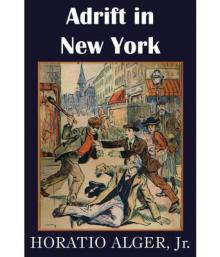 Adrift in New York: Tom and Florence Braving the World
Adrift in New York: Tom and Florence Braving the World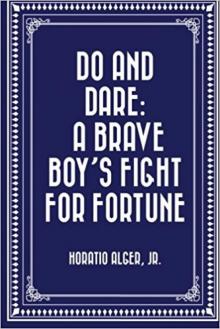 Do and Dare — a Brave Boy's Fight for Fortune
Do and Dare — a Brave Boy's Fight for Fortune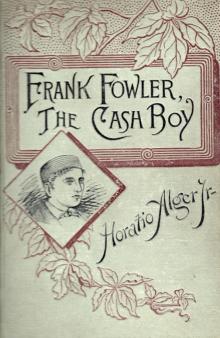 The Cash Boy
The Cash Boy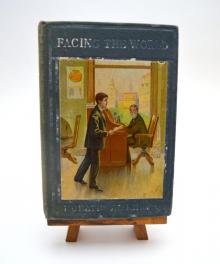 Facing the World
Facing the World The Young Explorer; Or, Claiming His Fortune
The Young Explorer; Or, Claiming His Fortune The Store Boy
The Store Boy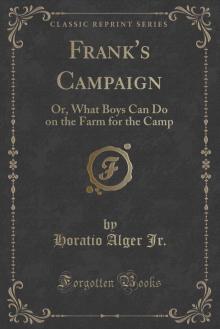 Frank's Campaign; Or, The Farm and the Camp
Frank's Campaign; Or, The Farm and the Camp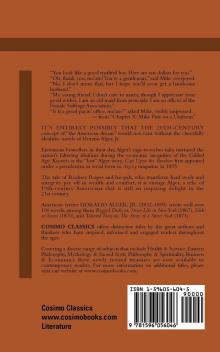 Cast Upon the Breakers
Cast Upon the Breakers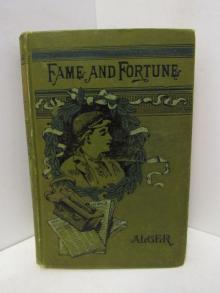 Fame and Fortune; or, The Progress of Richard Hunter
Fame and Fortune; or, The Progress of Richard Hunter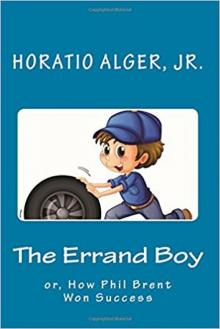 The Errand Boy; Or, How Phil Brent Won Success
The Errand Boy; Or, How Phil Brent Won Success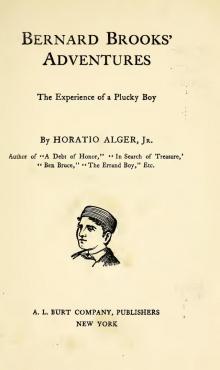 Bernard Brooks' Adventures: The Experience of a Plucky Boy
Bernard Brooks' Adventures: The Experience of a Plucky Boy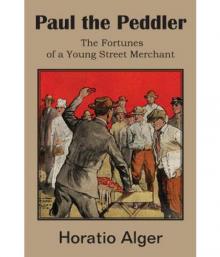 Paul the Peddler; Or, The Fortunes of a Young Street Merchant
Paul the Peddler; Or, The Fortunes of a Young Street Merchant Brave and Bold; Or, The Fortunes of Robert Rushton
Brave and Bold; Or, The Fortunes of Robert Rushton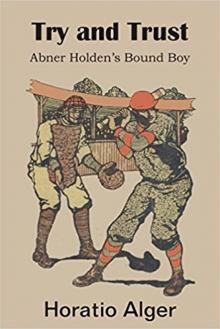 Try and Trust; Or, Abner Holden's Bound Boy
Try and Trust; Or, Abner Holden's Bound Boy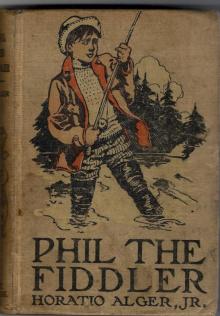 Phil, the Fiddler
Phil, the Fiddler In A New World; or, Among The Gold Fields Of Australia
In A New World; or, Among The Gold Fields Of Australia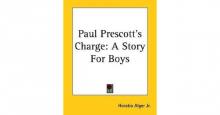 Paul Prescott's Charge
Paul Prescott's Charge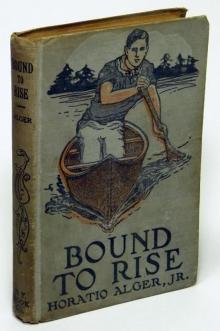 Joe's Luck; Or, Always Wide Awake
Joe's Luck; Or, Always Wide Awake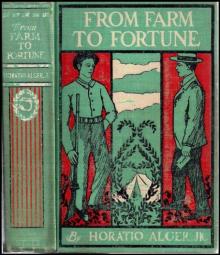 From Farm to Fortune; or, Nat Nason's Strange Experience
From Farm to Fortune; or, Nat Nason's Strange Experience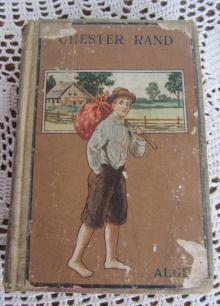 Chester Rand; or, The New Path to Fortune
Chester Rand; or, The New Path to Fortune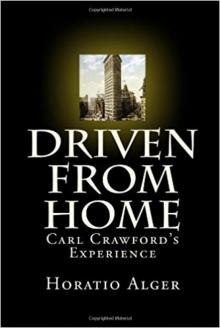 Driven from Home; Or, Carl Crawford's Experience
Driven from Home; Or, Carl Crawford's Experience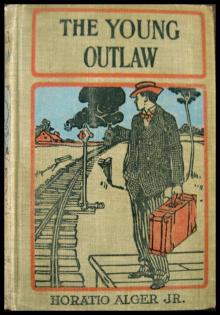 The Young Outlaw; or, Adrift in the Streets
The Young Outlaw; or, Adrift in the Streets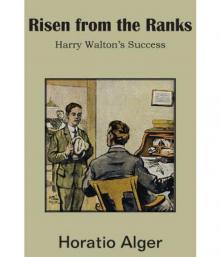 Risen from the Ranks; Or, Harry Walton's Success
Risen from the Ranks; Or, Harry Walton's Success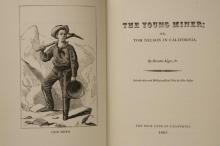 The Young Miner; Or, Tom Nelson in California
The Young Miner; Or, Tom Nelson in California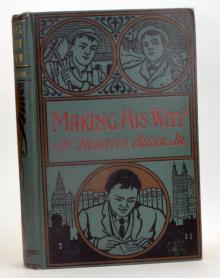 Making His Way; Or, Frank Courtney's Struggle Upward
Making His Way; Or, Frank Courtney's Struggle Upward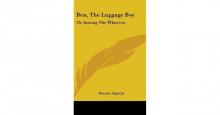 Ben, the Luggage Boy; Or, Among the Wharves
Ben, the Luggage Boy; Or, Among the Wharves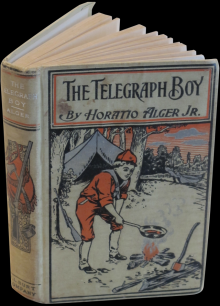 The Telegraph Boy
The Telegraph Boy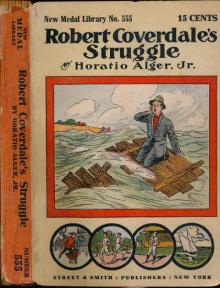 Robert Coverdale's Struggle; Or, on the Wave of Success
Robert Coverdale's Struggle; Or, on the Wave of Success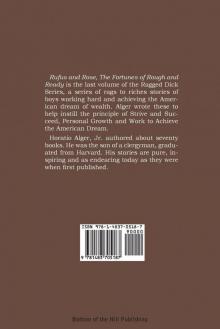 Rufus and Rose; Or, The Fortunes of Rough and Ready
Rufus and Rose; Or, The Fortunes of Rough and Ready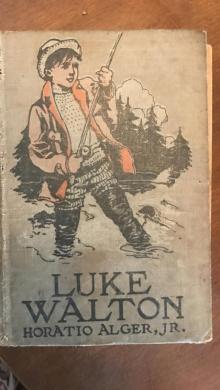 Luke Walton
Luke Walton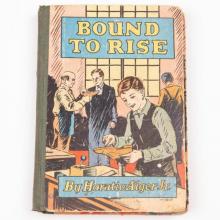 Mark Mason's Victory: The Trials and Triumphs of a Telegraph Boy
Mark Mason's Victory: The Trials and Triumphs of a Telegraph Boy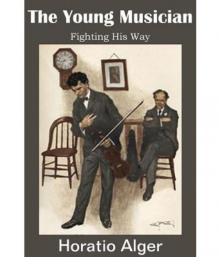 The Young Musician; Or, Fighting His Way
The Young Musician; Or, Fighting His Way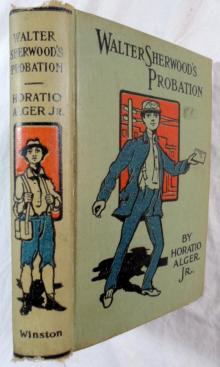 Walter Sherwood's Probation
Walter Sherwood's Probation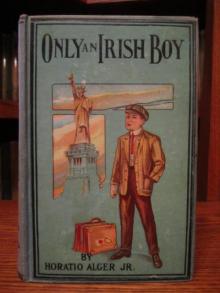 Only an Irish Boy; Or, Andy Burke's Fortunes
Only an Irish Boy; Or, Andy Burke's Fortunes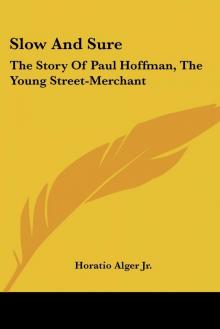 Slow and Sure: The Story of Paul Hoffman the Young Street-Merchant
Slow and Sure: The Story of Paul Hoffman the Young Street-Merchant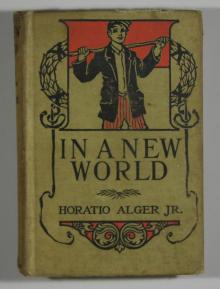 Herbert Carter's Legacy; Or, the Inventor's Son
Herbert Carter's Legacy; Or, the Inventor's Son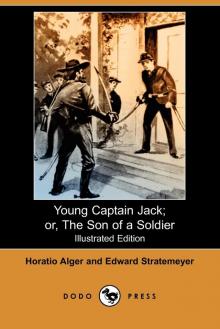 Young Captain Jack; Or, The Son of a Soldier
Young Captain Jack; Or, The Son of a Soldier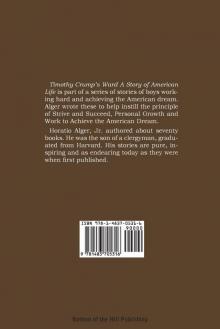 Timothy Crump's Ward: A Story of American Life
Timothy Crump's Ward: A Story of American Life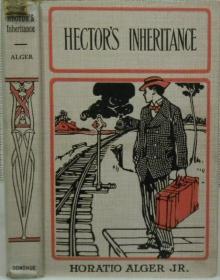 Hector's Inheritance, Or, the Boys of Smith Institute
Hector's Inheritance, Or, the Boys of Smith Institute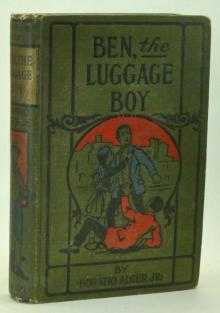 Ben's Nugget; Or, A Boy's Search For Fortune
Ben's Nugget; Or, A Boy's Search For Fortune